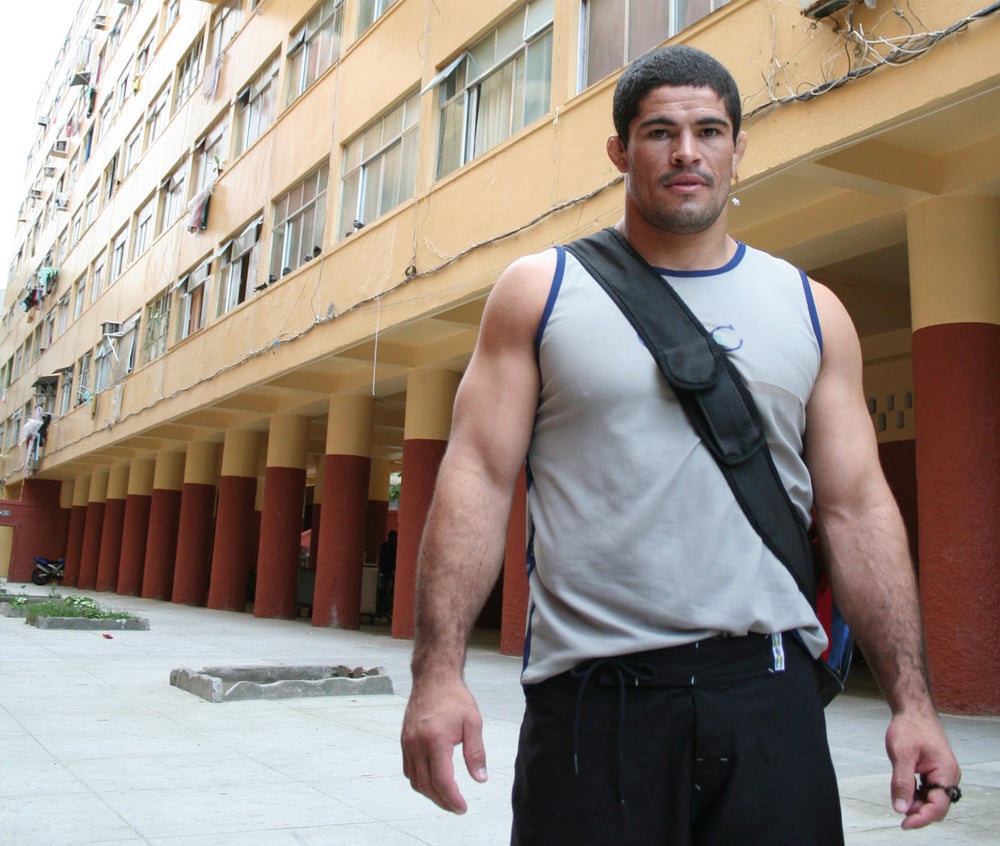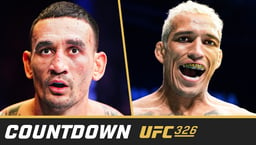
Issue 079
September 2011
A physical specimen with an impressive array of devastating submission attacks, Rousimar Palhares’ most impressive asset is his unshakable work ethic, forged from a young age in the fields of a Brazilian farm
MMA attracts many a young man searching for a better life. When options are few, the opportunity to earn a living with your fists become champions. Rousimar Palahares is a perfect example of this. Had he not discovered MMA he’d still be toiling in the fields, barely making a living for his family. Formerly an agricultural worker, Palhares now fights in the UFC’s middleweight division and has earned a reputation as one of the most dangerous grapplers in the sport.
Nicknamed ‘Toquinho’ (‘tree stump’ in Portuguese) because of his short, stocky build, Palhares is known for his unorthodox ground game. A master of leg locks, six of his nine submission wins have come by attacking his opponents’ lower limbs. His lightning-fast ability to slap on a knee-wrenching submission can end a fight in a heartbeat, as Lucio Linhares, Tomasz Drwal and Dave Branch all recently found out. Toquinho’s path has taken him from poverty to the most prestigious fighting promotion in the world, but he is a man still very much rooted to his humble past.
Raised in the small town of Dores de India in the state of Minas Gerais, Rousimar was one of ten children born to Robson and Francimeti Palhares. With four brothers and five sisters, Rousimar was the poverty-stricken family’s third child. “My family didn’t have anything, very poor conditions – not even a house,” he says. They lived in an area that consisted of multiple plantations, all operated by families under the direction of the land owners. After a cursory education, Rousimar found himself working in the fields at the age of eight. “There were a lot of families working there. There were many people working there and sometimes we worked together but a lot of the time we would have to split up,” he says. “I would go to another farm by myself to work. It was usually me and my mother picking coffee and beans. It was hard work, and I stayed with my mother to help her because it was too hard for her.” Working to “help his family survive,” Rousimar was taken by the landowner at age 14 and given a farm to manage in the nearby town of San Antonio – all by himself. “The owner made me a manager of my own farm at 14 because I learned everything from my father. By 14 I knew how to take care of a farm,” he says, with no small amount of pride.
Not long after Rousimar joined the UFC, a story began to circulate that he was once so poor that his family had to eat animal food to survive. He is visibly uncomfortable when talking about this period. “It happened a few times. It wasn’t every day. I don’t like to talk about this, it hurts to remember the past,” he says, tears welling in his eyes. “It was hard times. We made food from the dust of corn, a kind of cereal mixed with water. It was all we had. It was hard, hard times.”

FARMER TO FIGHTER
Times were tough for Rousimar and he lived an isolated life, completely unaware of mixed martial arts. “I did karate and capoeira when I was young, but I would have liked to have trained jiu-jitsu,” he says. “There was nobody to train with, nobody who knew jiu-jitsu, no gyms.” It was a chance encounter with a local fighter called Iran Brasileiro when he was 19 that changed his life forever. “One guy saw me in my hometown, he saw me lifting weights. That guy was going to fight MMA and he had nobody to work out, to spar with, because he was so big and strong. He invited me, saying, ‘Hey can you come and train with me and be a sparring partner?’ The guy saw me train and he said, ‘One day you’re going to be somebody in MMA’. He told me, ‘You don’t want to work on a farm, you should be a fighter.’”
Persuaded by Brasileiro, Palhares moved to Rio de Janeiro to pursue his goal of becoming a professional. He joined the world-famous Brazilian Top Team, home to legends such as Murilo Bustamante, Mario Sperry, Paulo Filho, Ricardo Arona and more. But life in Rio was tough. The transition to live in Rio de Janeiro was super tough,” he says. “I came to Rio by myself and I almost left and gave up many times, almost left MMA to go back home, because it was too tough.
Ten years later, he is now one of the best middleweights in the world. “The most important thing for me was my family, I felt if they were good then I would be also. I got better everyday and was able to take care of my family. That is what gave me the power to carry on, that my family needed help. In Rio we say you have to kill a lion a day to survive. And I felt this way every day. But God helped me to keep going, and I thank him for that.”

UFC’S RIO CARNIVAL
Palhares has been given a coveted spot fighting on August’s UFC 132 in Rio de Janeiro, an honor for any Brazilian fighter. This will be the UFC’s first show on South American soil in 13 years, and the gravity of the occasion is not lost on him. The 1998 event completely passed him by, as Toquinho didn’t see his first event until 2000 when he was shown a video of Royce Gracie fighting Ken Shamrock at UFC 1. “We didn’t even have a TV in our house,” he says. “To be in UFC Rio, to compete… I just thank God for everything’s that happened to me.”
Palhares faces a fellow Brazilian in Alexandre ‘Carcareco’ Ferreira. They share much in common. Both are short, muscular grapplers, and the fight seems destined to play out on the ground. Carcareco is a 13-year veteran with 25 fights under his belt, but Palhares feels confident and even has first-hand knowledge of his opponent’s strengths and weaknesses. “He’s very strong, very experienced. We trained together, we used to work out together here at Brazilian Top Team. We know each other very, very well. I’ll get ready the best way I can. I don’t know how I will win, but I will.”
For a man who came from nothing, fighting has given him everything. Ten years after leaving the farm he proudly tells of how he has used his winnings to buy his mother a house, and is keen to communicate that she will never have to pay rent again. He goes home once a month – sometimes more – to see them, though he says that he won’t be happy until every member of his family is taken care of.

Toquinho’s life has been a constant struggle and everything is the result of good old-fashioned hard work. He can often be found at BTT’s gym in Lagao, Rio de Janeiro, working out by himself before training, and staying on the mat long after everyone else has long gone. He attributes this work ethic to the lessons of his father. “My father was so tough, so hard. My father taught me how to be a man,” he says. “He said to me, ‘You have to be tough, you have to work hard, and you have to be a man, because life is not easy. But you are a man, you are my son and you are going to be tough.’ I cried, but I never gave up. I cried when I worked sometimes, but I never gave up. I knew I had to be a man.
“People would say to my father, ‘Hey you’re going to kill that kid.’ He made me work so hard. But my father said, ‘No, he is a man and he needs to learn how to survive in the world.’ If you want to be somebody in life you have to be ready for anything. At the time I didn’t understand why it was so tough, but now everything makes sense for me and why my daddy made me work so hard.”
Married, Palhares is yet to start a family of his own, but he is adamant his children will never have to struggle like he did. “You can guarantee I will do everything so my children don’t have to be like me.
“I want a better life for them. I give them what they need to be a man, I will prepare my son to be a man of honor with an education, and to have a good life who will follow in my footsteps.”
THE PRICE OF DREAMS
“You should never give up on your dreams, always believe, and always work hard, because you can make them come true,” says Palhares. “Always believe in God, and he will help you. Work hard, every day. Everything has a price in life, and the price of dreams is hard work.”
FACTS ABOUT BRAZIL
Jiu-jitsu has established itself in the top five of in the most popular sporting pastimes in Brazil...
1. Soccer
2. Athletics
3. Capoeira
4. Jiu-jitsu
5. Footvolley
6. Tennis
7. Basketball
8. Motorsport
9. Volleyball
10. Rugby Union
We wonder how long it will be after UFC 134 before MMA breaks into the Brazilian top 10?










